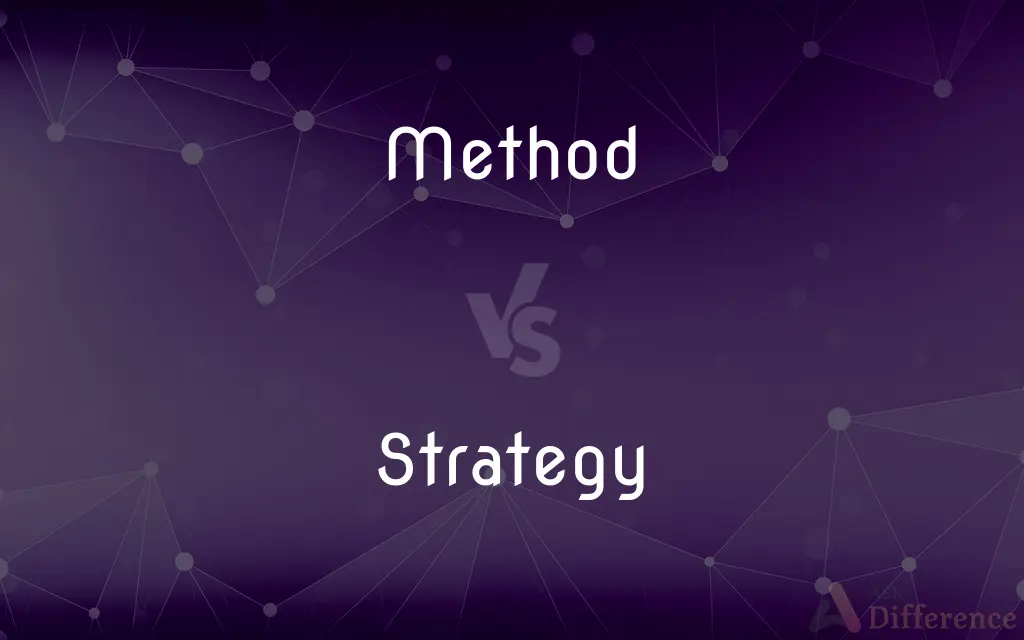Method vs. Strategy — What's the Difference?
Edited by Tayyaba Rehman — By Fiza Rafique — Updated on November 1, 2023
A method is a systematic way of doing something, while a strategy is a plan designed to achieve a long-term goal.

Difference Between Method and Strategy
Table of Contents
ADVERTISEMENT
Key Differences
A method refers to a specific procedure or process for accomplishing a task, often detailed and step-by-step. It’s the “how” in the equation of reaching an objective. Strategy, on the other hand, encompasses the overarching plan or high-level blueprint that guides the direction toward a long-term goal. It’s the "what" and "why" behind the overall efforts.
Methods are often tactical, used to execute specific actions efficiently and consistently. They are more about precision and the sequence of operations within a strategy. Strategies require a broader scope, taking into account various external and internal factors, predicting outcomes, and often involve deciding which methods to employ.
The choice of method is usually about efficiency, following best practices, or adherence to standards. In contrast, devising a strategy involves analysis, foresight, and often innovation, as it aims to navigate competitive environments or complex situations to reach a desired future state.
In practical applications, a method might be a tested way of teaching a concept in a classroom, like a didactic method. A strategy, in this context, would be the overall educational approach aiming at equipping students with critical thinking skills over the school year.
While a method could be universally applicable, a strategy is often unique to the situation and requires customization. For example, the scientific method can be applied across many experiments, whereas a company's strategy for market expansion would be tailored to its specific circumstances and goals.
ADVERTISEMENT
Comparison Chart
Definition
A systematic way of doing something.
A plan for achieving an overarching goal.
Scope
Narrow, focused on specific tasks.
Broad, focused on overall objectives.
Timeframe
Often used for immediate or short-term tasks.
Designed with a long-term perspective.
Flexibility
Usually rigid and structured.
Requires adaptability and may evolve.
Purpose
To execute or implement.
To guide decision-making and direction.
Compare with Definitions
Method
A particular form of procedure for accomplishing or approaching something.
The scientific method ensures a rigorous approach to research.
Strategy
A plan of action designed to achieve a long-term or overall aim.
The company's strategy included expanding into international markets.
Method
A technique used in teaching.
Interactive method is favored for engaging students effectively.
Strategy
A careful plan or method for achieving a particular goal.
The team devised a strategy to improve their sales numbers.
Method
A means or manner of doing something.
He had his own method for organizing his desk.
Strategy
A method or plan chosen to bring about a desired future.
Her strategy for college acceptance involved intensive study and extracurricular activities.
Method
A systematic or orderly sequence.
The recipe called for a specific method of mixing ingredients.
Strategy
The art of planning and directing overall military operations.
Sun Tzu wrote extensively on the strategy of warfare.
Method
An established or official way of doing something.
The laboratory followed strict methods for sample testing.
Strategy
Strategy (from Greek στρατηγία stratēgia, "art of troop leader; office of general, command, generalship") is a general plan to achieve one or more long-term or overall goals under conditions of uncertainty. In the sense of the "art of the general", which included several subsets of skills including military tactics, siegecraft, logistics etc., the term came into use in the 6th century C.E. in Eastern Roman terminology, and was translated into Western vernacular languages only in the 18th century.
Method
A means or manner of procedure, especially a regular and systematic way of accomplishing something
A simple method for making a pie crust.
Mediation as a method of solving disputes. See Usage Note at methodology.
Strategy
The science and art of using all the forces of a nation to execute approved plans as effectively as possible during peace or war.
Method
Orderly arrangement of parts or steps to accomplish an end
Random efforts that lack method.
Strategy
The science and art of military command as applied to the overall planning and conduct of large-scale combat operations.
Method
The procedures and techniques characteristic of a particular discipline or field of knowledge
This field course gives an overview of archaeological method.
Strategy
A plan of action resulting from strategy or intended to accomplish a specific goal.
Method
Method A technique of acting in which the actor recalls emotions and reactions from past experience and uses them in identifying with and individualizing the character being portrayed.
Strategy
The art or skill of using stratagems in endeavors such as politics and business.
Method
A process by which a task is completed; a way of doing something (followed by the adposition of, to or for before the purpose of the process).
If one method doesn't work, you should ask a friend to help you.
Strategy
The science and art of military command as applied to the overall planning and conduct of warfare.
Method
A technique for acting based on the ideas articulated by Konstantin Stanislavski and focusing on authentically experiencing the inner life of the character being portrayed.
Strategy
A plan of action intended to accomplish a specific goal.
Method
(object-oriented) A subroutine or function belonging to a class or object.
Strategy
The use of advance planning to succeed in politics or business.
Method
(slang) Marijuana.
Strategy
The science of military command, or the science of projecting campaigns and directing great military movements; generalship.
Method
(dated) An instruction book systematically arranged.
Strategy
The use of stratagem or artifice.
Method
Ellipsis of method air.
Strategy
An elaborate and systematic plan of action
Method
(transitive) To apply a method to.
Strategy
The branch of military science dealing with military command and the planning and conduct of a war
Method
To apply particular treatment methods to (a mold).
The company employs extensive use of 3D modelling combined with solidification simulation to ensure that critical castings are properly methoded.
Strategy
The skill of making or carrying out plans to achieve a goal.
Good strategy often determines the outcome of a chess game.
Method
An orderly procedure or process; regular manner of doing anything; hence, manner; way; mode; as, a method of teaching languages; a method of improving the mind.
Method
Orderly arrangement, elucidation, development, or classification; clear and lucid exhibition; systematic arrangement peculiar to an individual.
Though this be madness, yet there's method in it.
All method is a rational progress, a progress toward an end.
Method
Classification; a mode or system of classifying natural objects according to certain common characteristics; as, the method of Theophrastus; the method of Ray; the Linnæan method.
Method
A technique used in acting in which the actor tries to identify with the individual personality of the specific character being portrayed, so as to provide a realistic rendering of the character's role. Also called the Method, method acting, the Stanislavsky Method or Stanislavsky System.
Method
A way of doing something, especially a systematic way; implies an orderly logical arrangement (usually in steps)
Common Curiosities
Can a strategy change once methods are in place?
Yes, strategies can evolve, even if certain methods are already being used.
What is the main difference between a method and a strategy?
A method is a way of doing, while a strategy is a plan for achieving an end.
Is a strategy more important than a method?
Neither is more important; they are both crucial at different stages of planning and execution.
Can one strategy employ different methods?
Yes, a strategy can involve various methods to reach its objectives.
Can a method be part of a strategy?
Yes, multiple methods can be used to implement a strategy.
Do strategies need to be flexible?
Effective strategies often require flexibility to adapt to changing conditions.
Should a method be consistent?
Generally, methods should be consistent to ensure reliability.
Are methods related to execution?
Yes, methods are specifically about the execution of tasks.
Are strategies always long-term?
Strategies are usually designed with a long-term goal in mind, but they can also be for medium-term objectives.
Do strategies align with goals or objectives?
Strategies align with goals, providing the overarching plan to achieve them.
Do all methods have to be proven to be effective?
While proven methods are preferred, new methods can be tested and refined over time.
Is innovation more related to method or strategy?
Innovation can apply to both, but it is often a strategic element.
Are methods subject to change as frequently as strategies?
Methods tend to change less frequently, as they are more about consistent application.
Can the same method be used in different strategies?
Yes, a method can be applied across different strategies.
Can a strategy exist without specific methods?
A strategy without methods is incomplete, as methods are needed for implementation.
Share Your Discovery

Previous Comparison
History vs. Legend
Next Comparison
Cyberpunk vs. SteampunkAuthor Spotlight
Written by
Fiza RafiqueFiza Rafique is a skilled content writer at AskDifference.com, where she meticulously refines and enhances written pieces. Drawing from her vast editorial expertise, Fiza ensures clarity, accuracy, and precision in every article. Passionate about language, she continually seeks to elevate the quality of content for readers worldwide.
Edited by
Tayyaba RehmanTayyaba Rehman is a distinguished writer, currently serving as a primary contributor to askdifference.com. As a researcher in semantics and etymology, Tayyaba's passion for the complexity of languages and their distinctions has found a perfect home on the platform. Tayyaba delves into the intricacies of language, distinguishing between commonly confused words and phrases, thereby providing clarity for readers worldwide.













































